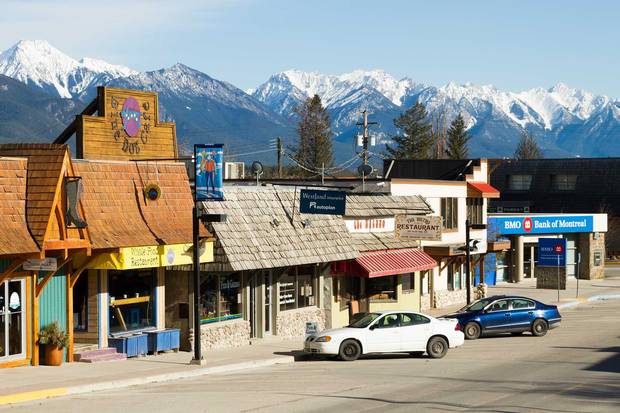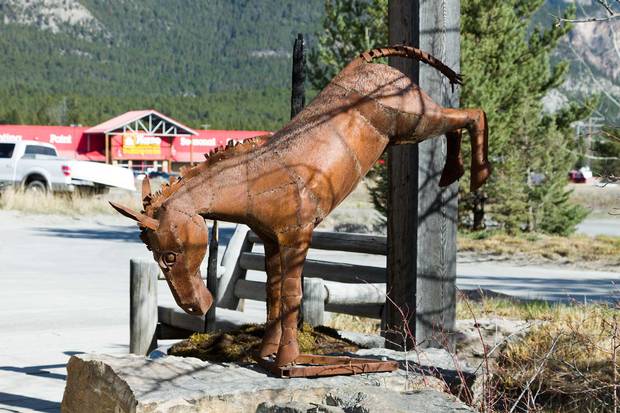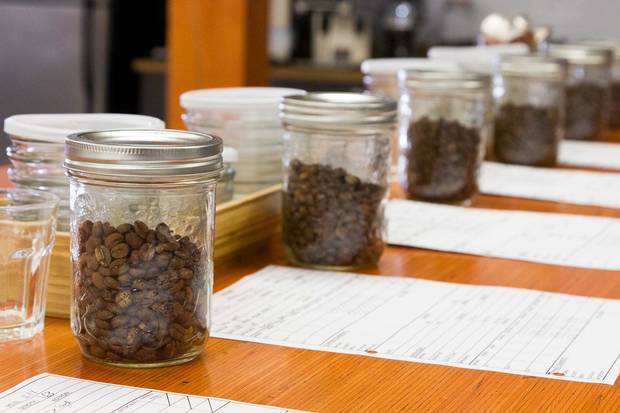One of the rewards of driving across Canada is getting to witness the changes that have come to the prairie landscape. The wind that once hummed and twanged through the telephone wires of W.O. Mitchell's novels now turns wind turbines the size of 747s. The wooden grain elevators that studded the horizon are mostly gone, replaced by concrete cylinders towering up at trackside like missile tubes. Instead of stopping at the gas station for a cup of lethal coffee and a package of fossilized chocolate raisins, you now pull into town and head down the main drag, hunting for that fair trade coffee shop. You know the one—the brave little new-age café with the worn plank flooring, the rich aroma, the delicious homemade oatmeal cookies, the local newspaper ( RCMP Recover Missing Llama) and the purple-haired waitress with the rivet in her nose serving hand-thrown pottery mugs filled with actual fresh-ground whole-bean coffee.
If you're really serious about the hunt, you have to push on, into the Alberta mountains, and turn left onto Highway 93 just past Banff. With the snow-capped cordillera of the Purcells on the west side of the highway and the Rockies on the east, you then cruise south for two hours, past elk valleys and sparkling rivers, to Invermere, British Columbia. There, on the banks of the Columbia River, you'll find the Kicking Horse Café, where every morning, a mob of healthy-looking retirees, woolly mountain bikers and swarthy cowboys stand in line waiting for their life-or-death libation. But this caffeine mecca is not just a café: Out back, teams of energetic young employees bustle away inside a large clean factory, roasting, packaging and shipping pallets of Kicking Horse-brand whole-bean coffee across the country.
Elana Rosenfeld and Leo Johnson started Kicking Horse 20 years ago, operating the business out of a garage, packaging their product in second-hand cardboard boxes, and shipping it to retailers by Greyhound bus. Their concept was whole-bean coffee that had to be ground at home by the consumer—a messy undertaking that everyone said wouldn't sell. Rosenfeld says, "We got lots of good advice and ignored most of it."
This year, Kicking Horse will sell over seven million pounds of what industry experts say is the best specialty coffee in Canada.
How did they do it?

The Rocky Mountains loom over Invermere’s downtown.
Rosenfeld grew up in Toronto, the daughter of entrepreneurial parents—her father a film producer and her mother the co-owner of a specialty food business. "My mother wanted me to become a chiropractor or some other kind of solid professional," she says. "So naturally I went to McGill and majored in religion and women's studies."
She liked Montreal, a "coffee culture" kind of place, where students in search of intelligent conversation gravitate to cafés rather than bars. After graduation, she and Johnson bought a van and drove out to Invermere, planning to "pump gas or do anything else" to finance a natural lifestyle of outdoor adventure, yoga and gardening. They rented a small cabin on a nearby ranch ("in the morning we had cows staring in our windows") and tried operating different mini-businesses, including a roadside stand they stocked with fruit from the Okanagan. "Eventually we bought a small restaurant in the middle of town," Rosenfeld says. "It was fun, but waitressing wasn't something I wanted to do for the rest of my life. So after a while we sold it and went travelling in Asia to figure out our next move."
Running the restaurant, Rosenfeld had noticed how difficult it was to find good coffee. "Most of the mass-market ground stuff was swill. We thought this might be an interesting opportunity—what if we got into the specialty coffee business?"
The more the couple researched the subject, the more complex and fascinating it became. Starbucks, the global chain that started in Seattle in 1971, had already proven that people were interested in a better cup of coffee, and willing to pay for it. But Starbucks didn't so much as create the artisanal coffee market as resurrect something with a very long history.
Legend has it that coffee was discovered by an Ethiopian goatherd more than 1,000 years ago. It spread across the Middle East, and by the 1500s the coffee houses of Istanbul were popular places to play chess, read books and enjoy coffee brewed the Turkish way—"black as hell, strong as death and sweet as love."
The coffee habit then spread to Europe, becoming an integral feature of French, Italian and English society. (In the mid-1600s, London had 300 coffee houses.) According to a possibly apocryphal story, a French officer named Gabriel de Clieu risked his head in 1723 by filching several coffee seedlings from Louis XIV's gardens at Versailles and sailing with them to the New World. Most of the plants died during the voyage, but de Clieu managed to keep the runt of the litter alive by nourishing it with his own ration of water. His "happiest hopes were founded," he confessed, on that poor "slip of a pink." The seedling went on to become the mother of every coffee plant in the western hemisphere. In 1773, Americans rebelled against punitive British taxes with the Boston Tea Party, and coffee became the preferred drink of patriots.
By the time Starbucks came along in the 1970s, Big Coffee had become a victim of its own dullness and uniformity. "I definitely have to give credit to Starbucks for reintroducing artisanal coffee and blazing the trail ahead of us," says Rosenfeld. "We were encouraged by their success, so in 1996 we decided to try launching our own brand."
Rosenfeld's mother was not impressed. The company website quotes her asking, "What are you two schmucks going to do with your lives? Sell coffee from your garage?" That was, in fact, the plan—and there was a large logistical wrinkle to overcome. Invermere, population 3,000, is a long haul over mountain roads from any large urban market and even further from the shady, temperate, volcanic mountains between the Tropics of Capricorn and Cancer where most of the world's coffee is produced.
Rosenfeld and Johnson found a broker in San Francisco who had relationships with farm co-operatives in Central America. "Our broker Alex [Mason] stuck his neck out and trusted us," says Rosenfeld. "Trust is very important because brokers put their own money out there and sometimes buyers like us don't pay their bills. We made a strict plan from the outset—pay our bills promptly and build a company based on ethics."
Rosenfeld and Johnson arranged to have pallets of whole-bean coffee shipped to California and trucked to Invermere. (Today, shipments land in Vancouver.) While searching for a brand name, Rosenfeld says they came across the story of Dr. James Hector, who was trekking through the mountains with the historic Palliser expedition of 1857 when he was kicked by a horse. "They were getting ready to bury him when someone noticed his eyelid flicker. They served him a cup of kick-ass coffee and he came back to life. So we decided—yes, Kicking Horse has to be the name of our company."

A sculpture announces the location of Kicking Horse Coffee’s headquarters.
To fund the business, the couple raised $75,000 by mortgaging their house. "The banks wouldn't support us," Rosenfeld says. "If we had wanted to buy a piece of logging equipment for a million dollars, no problem. But a coffee business? Forget it." Their prospects improved when Thrifty Foods agreed to stock Kicking Horse Coffee in its 13 supermarkets on Vancouver Island. Meanwhile, the federal government's Business Development Bank made a series of five loans to the company, starting in 1998. Rosenfeld and Johnson gradually moved their business out of their garage and into a 60,000-square-foot custom-built plant, and started hiring staff to handle receiving, roasting, packaging and shipping. In 2003, the firm went 100% organic, and in 2007 it deepened an earlier fair-trade commitment, going 100% on this front as well. "I'm a gardener and nature girl, so switching to organic was kind of an obvious choice," she says. "But fair trade was a more serious decision. Nobody even knew what it was."
The fair trade movement is founded on a few core principles—above all, that producers in developing countries deserve to make a decent living, and that buying commodities at a fair price is a better way of promoting sustainable economies than foreign aid. "Converting to 100% fair trade was risky," Rosenfeld admits. "We were a new player and we were already dealing with a lot of challenges. But…I was determined to go for it. So in 1998 we became one of the first companies in Canada to get a fair trade licence. Now there are hundreds."
Another challenge was selling the concept of whole-bean coffee to retailers and distributors. Peter Neal, co-owner of Toronto-based distributor Neal Brothers Foods, recalls being intrigued by the idea when Kicking Horse came onto his radar in 2004. He made a deal with Rosenfeld to distribute her product. But when he pitched the concept to "cool friends" in Toronto and contacts in the specialty food industry, they were unimpressed. "They told me the average shopper is not going to go out and buy a $30 grinder just to make a cup of coffee," he says. "I talked to 15 experts, and they all said it wouldn't work."
Loblaws has a reputation for innovative products, and its head buyer admitted to Neal that she liked Kicking Horse's coffee and its saucy marketing. But she didn't like the idea of whole beans. "She said, 'Tell her to grind it and we will buy $1-million worth.'" Neal says he phoned Rosenfeld "in a state of excitement" and told her he had just made a million-dollar deal. "I couldn't believe it when she quietly said, 'No, Peter, we are not grinding it. We are going to stick to our guns. They will come around.'"
Neal says that exchange and other negotiations taught him that Rosenfeld "will not compromise" on matters of principle. "From the very start, she was convinced that retailers and consumers needed educating, and she was going to do it. She was ready to devote whatever energy and money it took to teach them that the best cup of coffee comes from fresh-ground whole beans. And, of course, she was right. Here we are, 11 years later, distributing Kicking Horse whole-bean coffee to more than 1,000 outlets across Central and Eastern Canada, almost all of which are retailers." (All that said, in 2014 the company added ground coffee to its product lineup; the point, presumably, had been made.)

The Kicking Horse packaging line.
In Canada, annual consumption of coffee amounts, by one count, to about 14 billion cups—a market said to be worth about $5 billion or $6 billion. Most of the retail market is dominated by international brands like Folgers and Maxwell House. As a privately held company, Kicking Horse doesn't divulge its financials. But it's happy to report that it dominates fair trade organic whole-bean coffee, a niche that now constitutes a hefty 12% of the Canadian market. "According to Nielsen, we're the number-one organic coffee in the country, and the number-one whole bean," says Rosenfeld. "When we started out, nobody was grinding coffee except Italians. But Canadians wanted better coffee, and we got into the market at the perfect time." (Others have followed Kicking Horse's lead, of course. Indeed, Muskoka Roastery, based in Huntsville, Ontario, uses an outdoorsy marketing schtick similar to Kicking Horse's.)
Toronto-based product developer Elspeth Copeland says that Rosenfeld's sort of obstinacy is key for start-up companies. "The more innovative the product, the more you're going against the grain," she says. "Small companies with a wonderful vision typically face a dilemma when they achieve some initial success. They come under pressure to cut corners or change their formula in order to meet rising demand. That's when there is a decline in quality and the company fails. I have been watching Kicking Horse for over 10 years and I think they've shown tremendous courage and stubbornness in staying true to their original vision.
"Elana Rosenfeld is a great promoter, and the temptation is to think that Kicking Horse's success is all about marketing. But it isn't, it's about quality. In the food business, it's always about quality."
As Rosenfeld's vice-president of quality assurance, it's Tom Hoyne's job to ensure that logistical challenges don't compromise the product. "There are always problems," he says. "Our coffee is grown by small farmers on steep mountain hillsides in remote regions that typically lack infrastructure like roads, bridges and transportation. Roads can get washed out by rainstorms and containers can be damaged in shipping. But we are betting that increased revenues from fair trade will improve the infrastructure over time."

The quality control station, where batches are sampled.
Kicking Horse faced another sort of obstacle in 2010 when Rosenfeld and Johnson parted ways as a couple. In 2012, the business partnership was also dissolved. That year, Rosenfeld signed a deal with Branch Brook Holdings, a New Jersey-based private equity firm that specializes in natural foods. Branch Brook became majority shareholder. Rosenfeld stayed on as a shareholder and CEO, and the equity deal allowed her to continue growing the business, developing new markets in the United States.
While the company now sells seven million pounds of coffee annually between Canada and the U.S. (the latter accounting for 15% of sales), Rosenfeld says the stateside market is much more complex and challenging than she expected. "We started on the West Coast because that's where a lot of food trends originate. But we really had to change our approach to get noticed. We went to smaller packages at a lower price so we could attract consumers who have no brand awareness of our product." Pursuing online sales via outlets like Amazon has also helped.
The company's payroll has grown to more than 90 employees, and its spacious, aromatic factory is stacked with burlap mountains of green coffee and pallets of packaged product ready to ship. Employees manage an array of chuffing, impressive machinery—conveyor belts, enormous roasting ovens, and a stainless steel robotic combine that ingests sheets of empty packaging and kicks out sealed packs of specialty coffee like Grizzly Claw, Smart Ass and 454 Horse Power (named, at the insistence of one of Rosenfeld's young female employees, after the famous big-block engine). Music keeps everyone energized, with a Post-it request on the sound system— No Lady Gaga.
The company has its own (leased) glossy black semi-trailer with the big Kicking Horse logo on the side, and it is on the road constantly, bringing in raw coffee beans from the Port of Vancouver and shipping roasted product to the company's distributor in Calgary. Retail outlets usually stock the brand at around $16 per pound, but some large retailers sell it as a loss leader, which excites shoppers but doesn't thrill Kicking Horse. "We don't want people to expect those lower prices," Rosenfeld says. "It undercuts our price structure and retailers don't make any money off it, so they're not motivated to restock."
Sounds like she's sticking to her guns again. But what about that claim to be
grounded in ethics? After all, virtually every company claims to be ethical today.
Kicking Horse does appear to walk the walk. It contributes annually to the Nature Conservancy of Canada. Staffers visit Kicking Horse's suppliers in Central America to make sure that fair trade practices are being honoured. And the company is a cheerleader for healthy living in the Invermere region. Employees say that Rosenfeld has stayed true to her original vision of creating a folksy, artisanal company driven by creativity and the spirit of adventure. "Working here is like winning the job lottery," says team leader Mia Ciona. "It's like a big happy family, and Elana is great about making everyone feel included and respected. We have company picnics, free lunch days, and everyone really believes in the product. The company has such a great reputation that we get job applications from people all across Canada." Kicking Horse currently sits at 10th spot in the medium-sized company category in the Best Workplaces in Canada ranking.
"I really think it's important to have a happy workforce," says Rosenfeld. "We want our employees to have healthy and vibrant lives because that's good for them and good for the company. It's confirmed my belief that you can stick to your principles and still be profitable. Just focus on something you love—which, in our case, was something as simple as giving people a great cup of coffee."
